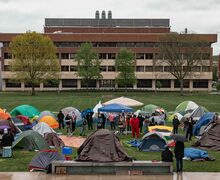Indigenous students present concerns, solutions to Syverud
Daily Orange File Photo
The students’ first solution was for the Native Student Program to maintain its residency at 113 Euclid Avenue.
Indigenous students at Syracuse University met with Chancellor Kent Syverud on Dec. 3 to share their concerns and solutions after a series of hate crimes and bias-related incidents.
Students presented a letter containing 20 solutions to Syverud, Chief Diversity and Inclusion Officer Keith Alford and Vice President for the Student Experience Rob Hradsky, among other university officials. The meeting occurred about two weeks after an anti-indigenous message was found on a post-it note in Flint Hall. The message is one of at least 17 hate crimes or bias-related incidents that have been reported on or near SU since Nov. 7.
The students want to increase the visibility of the indigenous community and to promote inclusion of indigenous culture within SU’s community and coursework, said Ethan Tyo, a graduate student in the David B. Falk College of Sport and Human Dynamics.
The meeting was “pretty productive,” and allowed indigenous students to bring their stories and perspectives to light, Tyo said.
“SU is very significant to indigenous people,” Tyo said. “It’s a great relationship and I think that it’s something that the university wants to uphold and respect, and at the same time there are still chances to help bring some of the underlying issues that haven’t been given the visibility that they need to light.”
The students’ first solution is for the Native Student Program to maintain its residency at 113 Euclid Avenue. Students heard rumors that the program may be relocated to the renovated Schine Student Center in fall 2020, and wanted confirmation from the university that the move wouldn’t happen, said Maris Jacobs, a senior in the College of Visual and Performing Arts and a member of the Mohawk Nation.
Dedicated spaces provide indigenous students with opportunities to discuss sensitive issues and develop a sense of community that contributes to their academic success, students state in their letter.
The university confirmed the program will remain at 113 Euclid Avenue, Jacobs said.
The students also ask that SU creates study abroad programs in partnership with indigenous nations, allowing all students to learn about indigenous histories, territories and cultures.
Revising SEM 100 to include mandatory participation in the blanket exercise — in which participants stand on blankets representing indigenous lands that were colonized — and a visit to the Haudenosaunee heritage center Skä•noñh – Great Law of Peace Center is the eighth solution of the students. They also ask that SU hire at least two indigenous mental health counselors.
The black student-led movement #NotAgainSU demands that SU make changes to SEM 100 and increase the number of mental health counselors of marginalized identities.
Ionah Scully, a doctoral student in the School of Education who is Cree Métis of the Michel First Nation, said the students all support #NotAgainSU. Seeing the injustices experienced by other people of color led the indigenous student community to realize what they experience in solidarity, they said.
Indigenous students at SU are invisibilized on campus, Scully said. Their experiences with racial microaggressions — daily prejudices directed toward minorities both consciously and unconsciously — are often unaddressed, they said.
The students listed several solutions concerning academics and curriculum at SU, including the implementation of a Native American and Indigenous Studies major, a recognized language course for at least one Haudenosaunee language and the inclusion of indigenous perspectives and history in course offerings.
“As indigenous students in higher education, we repeatedly find ourselves forgotten and left out of important narratives and conversations that inevitably lead to misperceptions and miseducation,” the students’ letter reads. “Indigenous students carry the responsibility of educating others about our history and our presence here on this campus.”
Expanding the Haudenosaunee Promise and Honor scholarships to cover graduate students and providing financial aid specific to indigenous students are additional solutions from the students. The scholarships provide indigenous students the opportunity to excel in a world that tries to erase them, the letter states.
The letter also includes a provision for hiring two permanent, full-time assistant directors to the Native Student Program to oversee the academic success of indigenous undergraduates.
The most significant confirmation the students received during the meeting concerned the location of the Native Student Program, Tyo said. The students are actively setting up additional meetings with university administration to further discuss the rest of their solutions, and will reconvene after winter break, he said.
“It’s going to be an ongoing dialogue that we set forth,” Tyo said. “But (SU has) been receptive to this and so far have acknowledged that there is a lot of work that needs to be done and that they’re interested in pursuing.”
Published on December 11, 2019 at 2:13 pm
Contact Emma: [email protected]




